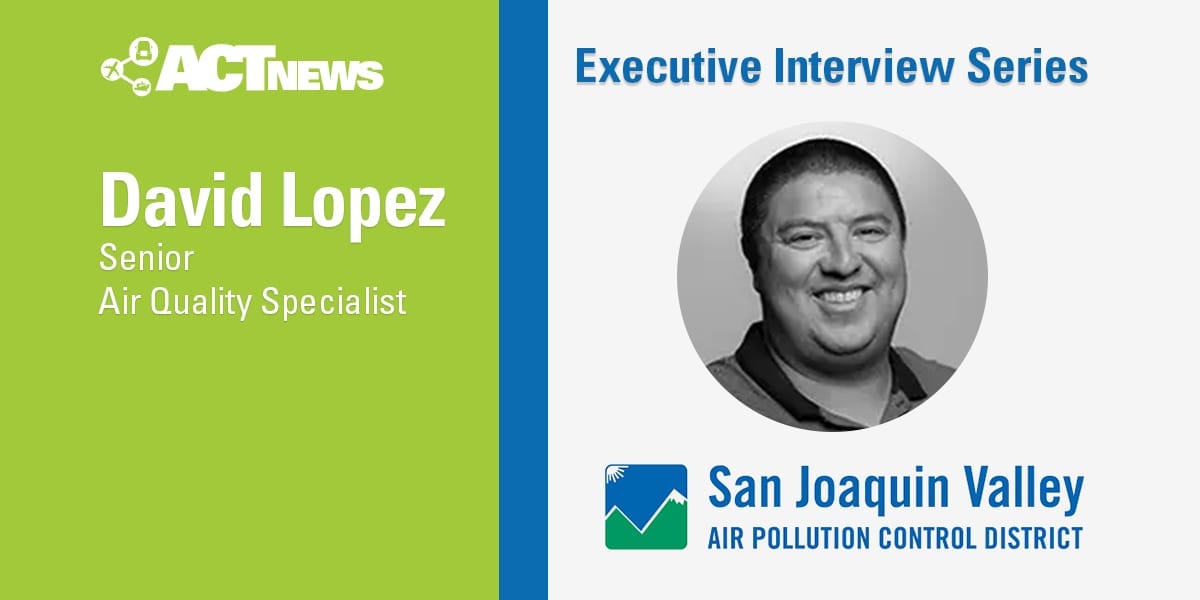An ACT News Executive Interview with David Lopez, Senior Air Quality Specialist, San Joaquin Valley Air Pollution Control District, to learn how they are fostering cleaner air in Central California.
The San Joaquin Valley Air Pollution Control District (SJVAPCD), which serves an area extending roughly from the Sacramento Delta to the Tehachapi Mountains, is one of the primary funders of clean transportation projects in the Central Valley and has administered tens of millions of dollars in recent years to fund diesel replacement projects.
In this interview with GNA and Valley Fleet Support, David Lopez, the Senior Air Quality Specialist at SJVAPCD, shared news and thoughts on how fleet operators can leverage incentives to implement clean transportation projects.
ACT News: What impacts does SJVAPCD expect as a result of Covid-19? Is it affecting any programs right now?
“We continue to pursue incentive funding to help support future programs, such as the Electric Yard Truck Program.”
David Lopez: That is a great question. Everyone must look at things on a day-to-day basis to see how the situation is impacting fleets and businesses. Right now, what I have seen has been very positive, given the circumstances. Grants and funding opportunities are moving forward. We have fleets continuing to turn in applications for new alternative fuel vehicles. SJVAPCD continues to pursue grant programs and incentive funding to help support our existing programs and future programs, such as the Electric Yard Truck Program. We pursue funding through the EPA or California state funds as they become available. We have been working with local fleets and our partners here in the Central Valley to find out how they are being impacted by the virus. If they have an existing grant agreement and they need to extend it, we make sure to work with them and not be overly taxing in the process. We make sure we come to a good resolution for everyone involved.
Over the next few years, we will continue to pursue additional funds and work with our fleet partners. The Central Valley is required to meet state and federal environmental standards related to transportation. As an incentives team we are going to continue to pursue available funds and work in conjunction with our stakeholders to make sure we meet the environmental goals.
ACT News: Can you tell us a little bit more about the timing of the upcoming Electric Yard Trucks Program?
“The electric yard truck technology has proved it meets the needs of companies and their operations.”
David Lopez: Yes, we’re very excited about this project! We are looking at opening a first-come, first-serve over-the-counter application most likely in July or August. There are a very large number of yard truck units in the Valley that can be replaced. The electric yard truck technology has proved it meets the needs of companies and their operations, while reducing emissions at the same time. The yard truck program can be partnered with California’s CORE program, so there are some additional funds that fleets can use to reduce their overall initial cost. I would highly recommend signing up to our district’s listserv to get updates when this program comes out.
ACT News: Many organizations may think they are too small to implement an alternative fuel project. What would you say to these fleets? What opportunities exist for different sized fleets?
“Fleets should reach out to their local stakeholders and get in touch with resources such as Valley Fleet Support.”
David Lopez: Many smaller fleets are asking themselves, “How is this going to be beneficial for my business?” For the small fleets, there is a really great opportunity to learn from the successes of larger projects such as Bolthouse Farms. I would also tell them to reach out to their local stakeholders and get in touch with resources such as Valley Fleet Support.
If you want to speak with the Air District personally, we are happy to talk with you about your vehicles and your operational needs. We can help you work with the local utilities and any of the other permitting agencies you will need to consult with throughout this process.
There are many stakeholders that are very willing to help provide feedback and give tips. I would suggest people talk to the manufacturers and stakeholders you will be working with. Also, talk to your local public agencies that provide funding, handle permitting, and provide electricity as well. Once you speak to them, you will realize that it really is not that daunting. There are so many people that can guide you on the path that is best suited for your company.


